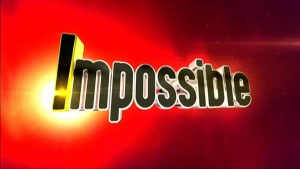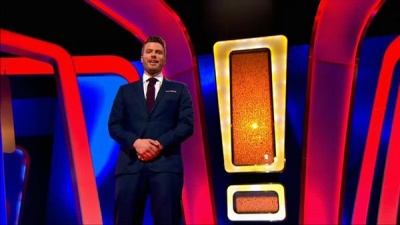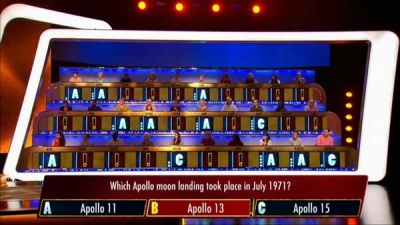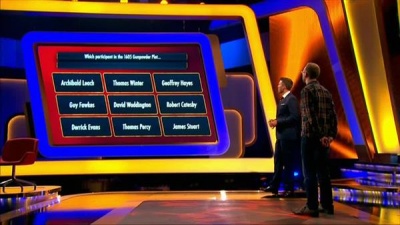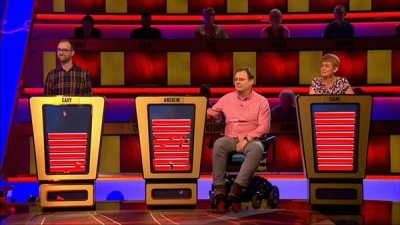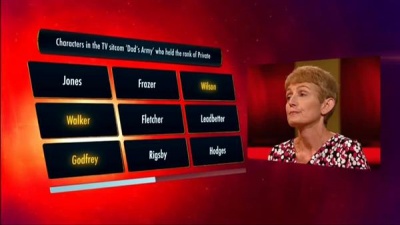!mpossible
Synopsis
A group of players answer multiple choice questions to avoid elimination; basically an updated Everybody's Equal/Whittle.
The opening round asks five multiple choice questions, each with a right answer, a wrong answer and an impossible answer. Wrong answers aren't right, impossible answers can't be right; for example, if the question was “who was monarch at the turn of the 20th century”, George VI might be a wrong answer, since he was king between 1936 and 1952, but Albert I would be impossible, because there were no British monarchs with that name. (You can't say you don't learn things from this site…) Right answers score a point, wrong answers score nothing and impossible answers or answers given after time has expired see the contestant eliminated. If there is only one player left in this first round, they are automatically put through to the second round if they have at least one point to their name.
In the second round, whichever contestant has the most points (or, in the case of a tie, how quickly they've locked their answers in) after five questions is left after the opening skirmish picks one category out of four is faced with a 3x3 grid consisting of one right answer, three wrong answers and five impossible answers. The contestant is then given the first half of the question and must eliminate the five impossible answers, each elimination putting £100 in their prize pot. After five of these, the contestant is shown the rest of it and must pick the right answer to secure their place in the final; a wrong answer sees their final chance offered to the next place player and an impossible answer sees them coming back for the next show. This process repeats itself twice, so is played three times in all, with the second finalist picking from three categories and the third picking from two.
As players are eliminated after selecting Impossible answers, we can reach a moment with only one player left in the opening rounds. If this happens, the round screeches to a halt, and the last player standing plays the cash board. When there's no-one left in the game to give answers in this second round, they go back through the players most recently eliminated. It sounds hideously complex, Rick Edwards makes it seem as simple as falling off a log.
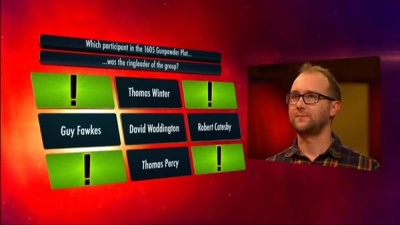 That's what a Wipeout looks like.
That's what a Wipeout looks like.The final is played as follows. Each contestant has ten lives. Questions on the buzzer, right answers knock a life off their opponents, wrong answers cause the contestant to lose a life. Some of the questions are Impossible; if the contestant says "Impossible" to one of these, then the other contestants lose two lives, but if the contestant says Impossible to an answer that is not Impossible, or gives any other answer to an Impossible question, then it is the contestant who loses two lives. Whoever is left after the other two have lost all their lives plays the jackpot round. Players who have made it to the jackpot round twice are replaced whether successful or not.
For the jackpot question, the surviving contestant faces another 3x3 grid containing three of each kind and must speak their three answers within ten seconds. To win the jackpot of £10,000, the contestant must pick all three right answers, but if they pick an impossible answer, they return to the next show with nothing.
A number of small timeslot and episode number changes were made in subsequent series. Instead of using the same thirty players throughout fifteen episodes, they rotated sets of twenty-four every ten episodes. Players who made the final were replaced no matter what they won, and everyone was replaced at the end of ten episodes.
From the fourth series, sets of contestants were replaced after five shows rather than ten, to allow for a 25-episode series, and finalists weren't replaced. For the fifth series, the sets shrunk even further, from twenty-four to twenty-one. For the eighth series, as a hopefully temporary consequence of the COVID-19 pandemic, the pool shrunk even further - to a dozen players.
!mpossible Celebrities, which went out on Saturday teatimes, has a panel of 18 contestants, replacing finalists whatever they win. The celebrity edition has almost the same rules as the civilian shows, except that an Impossible answer in the final halves the jackpot for the nominated charity.
The series remained popular enough for the BBC to air over two and a half series in less than a year; as many as Pointless. At the start of the third series, we suggested it might be worth giving it an outing in the 5.15 slot whenever Pointless airs repeats; during summer 2018, the show did just that. However, it moved back to 2.15 for its fifth series. And, for the first two weeks of series seven and the first and second Fridays of series eight as a consequence of Doctors not airing on those days as a COVID-19 consequence, to 1.45 and back.
Key moments
Rick playing with the £10,000 question at the start of each episode. William G. Stewart would be disgusted.
Inventor
A Mighty Productions format devised by Hugh Rycroft.
Theme music
David Roper and Nick Norton-Smith, credited as "Composer".
Trivia
The jackpot of £10,000 is paid out in pound coins - when it's won, the giant exclamation mark in the studio empties its contents into a hopper beneath. So that this technical wonder works, !mpossible credits Steve Webster for "Coin Machine Logistics".
Voted the Best New Show in this site's Poll of 2017.
In the first series, contestants had two chances to reach the final. No-one won £20,000 when it was possible to do so, although one contestant (Gerard Rocks) took home £11,400, and three other contestants (the first of which, in episode seven, was Andrew Townsley, who would later win £500,000 on Who Wants to be a Millionaire?) took home £10,000 apiece. Andrew was also the first £0 winner, in episode four. The first £100 grid (i.e. all four non-impossible answers were given) was in the last episode of series three.
On at least two occasions, the final round was tweaked to accommodate contestants with poor eyesight. Each answer was preceded by a number, and on Rick's second read-through of the answer the contestant said 'yes' to indicate their answers. Coincidentally, both contestants - Rachael Neiman (later Neiman-Wiseman) in series 4, episode 23 and Ellie Mackin in series 7, episode 1 - had previously been on Mastermind.
Series 7, episode 13 was shunted off to the second channel to make way for US Election coverage.
When BBC1 repeated most of series six in 2021, episode 35 was dropped due to issues with the editorial. If anyone knows what was wrong with it, do write in.

